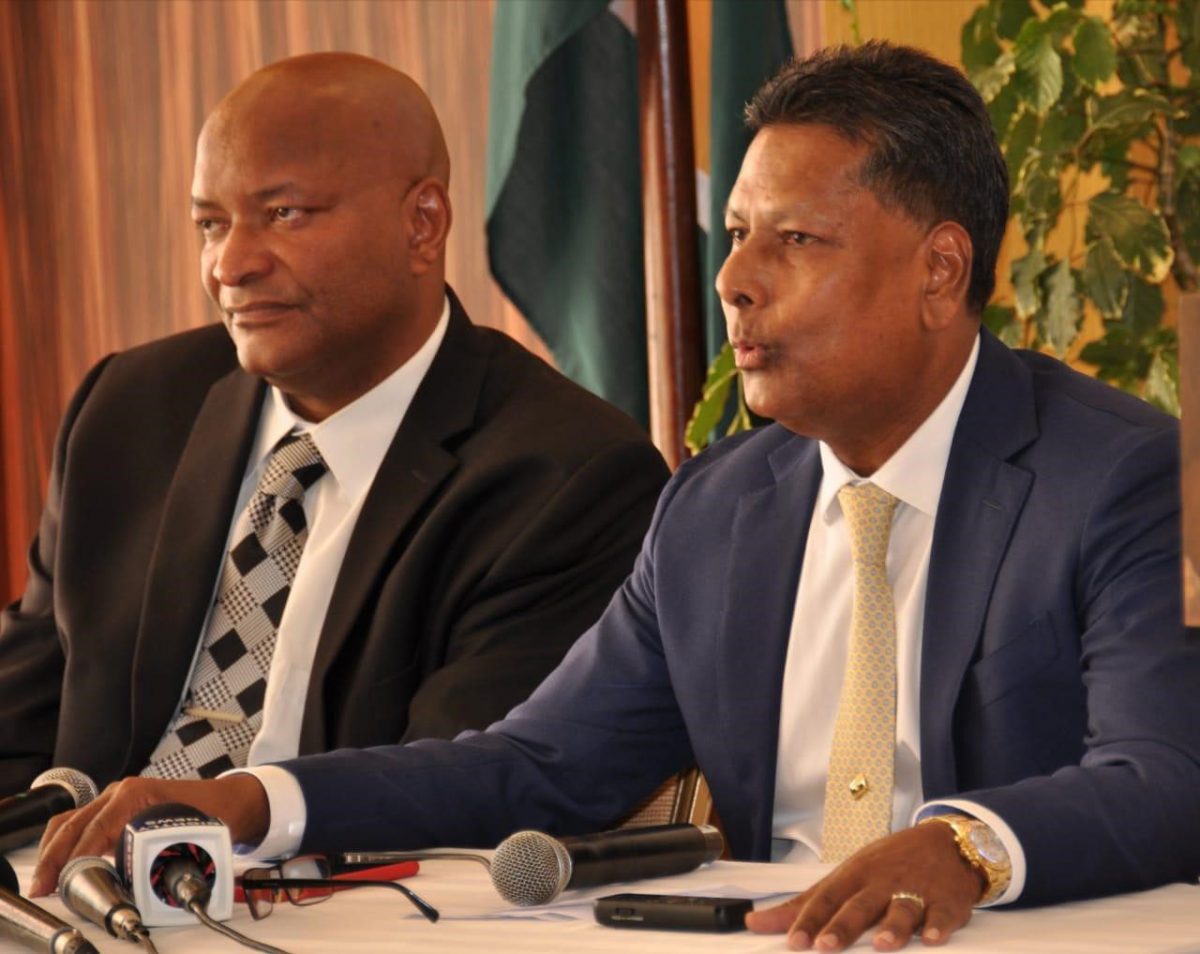The Change Guyana party yesterday announced that it would make sweeping across-the-board tax cuts should it be elected into office but it could not immediately say what measures would be implemented to cushion the likely deficits in revenue that would be created.
An immediate reduction in Value Added Tax (VAT) from 14% to 12% was floated.
“We do not agree with the level of taxation in Guyana today,” Change Guyana’s presidential candidate Robert Badal yesterday told a press conference at his Pegasus Hotel, in Kingston.
When the party’s leaders were asked about the revenue to the state that would be lost as a result of their cuts and how they would make up for the losses, they said more analysis was needed. “To make that evaluation at this point in time is difficult because you are required to prepare a budget to do that,” Badal said.
And while the party did not propose a minimum wage, it announced that it would start income tax deductions only after a person earns over $100,000 per month in salary.
“In order to allow employees to have direct control over more of their earnings, we commit to a $100,000 tax threshold in 2020,” accountant and prime ministerial candidate Nigel Hinds stated.
“Imagine a person with a family earning $100,000, having $15,000 deducted before he even receives his paycheck… to tax anyone earning below the cost of living amounts, in my mind, to state extortion,” Badal posited.
He said that it was too burdensome to ask a family that may have bought a home 20 years ago and serviced a mortgage through much sacrificing to also have to pay taxes on that property after paying income taxes.
According to Badal, in four years the income tax threshold in Guyana moved only from $50,000 to $65,000, while the cost of living for a household moved up to $120,000 per month. “This means the tax benefits only increased by $4,200 per month. That can’t even buy a meal; how embarrassing,” he lamented.
And while government said that it raked in some $145 billion in revenue in 2018, $216 billion in 2019 and expects $239 billion in 2020, Badal said that there was no development in the country to show for the large revenue generated. “This is no way to achieve what the coalition boasted: ‘a good life for all,’” he said.
“Even with the more than 60% increase in tax collection, there has been no attempt by the government to relieve taxpayers of the burden of excessive taxation. In fact some 200 new taxes were introduced, including on education, water and electricity. The largest contributor to poverty in Guyana, now more than 30%, is excessive taxation,” he added.
Zeroing in on duties and taxes on vehicles, Badal said that the current measures make it almost impossible for the average family to afford a used car, much less a new one, on meagre incomes.
“The same extortionary taxation policy is seen in their taxes on motor vehicles and on local businesses… This is nothing but state extortion. And what it does? Make our people poorer and facilitates corruption,” he said.
Hinds also outlined a number of measures that a “Change Guyana government” would undertake to ease the burden of taxes on the working public. The current system, he said, makes it unrealistic for many young and employed Guyanese to own a new vehicle. He said his party’s proposed reduced tax rates on vehicle imports will enable a significant number of Guyanese to acquire new vehicles and live their lives with more dignity, safety and happiness.
He said for vehicles under four years of manufacture, Change Guyana plans to implement an overall 50% tax, instead of the current 82% overall tax, on vehicles between 1500cc and 2000cc; 75% tax, instead of the current 247% overall tax, on vehicles between 2000cc and 3000cc; and 100% tax, instead of the current 297% overall tax on vehicles over 3000cc.
Hinds believes that the public has to ensure that this country moves “away from the current system that primarily allows Ministers, high-level state employees, and senior government contract workers to enjoy the pleasurable experience of owning or using new vehicles,” while the masses suffer. “We believe the building of a middle-class is a forerunner to economic development,” he said.
The party is also proposing similar reductions and adjustments for businesses. “We pay corporate tax of between 27% [and] 40%, VAT of 14%, customs duty of 10 to 20%, withholding taxes of 10 to 20% on professional services that introduced technologies not available in Guyana, property taxes, among others. We tax investments of local companies while foreign companies are embraced with all sorts of tax concessions…,” he pointed out.
“An effective tax policy should be designed to promote economic growth by stimulating investments that create sustainable jobs and income, at the same time providing tax shelters for the lower income earners to achieve better income equality and a better life for all. An effective tax policy should, given our embarrassingly low stage of development, encourage investments in physical infrastructure of roads, buildings, of telecommunications and IT infrastructure, medical care, education, and agriculture, not discouraging such investments,” he added.
Hinds listed a number of proposed measures under his party’s tax reform programme. They include stimulating accelerated economic growth by promoting investments by the private sector in key development areas, thereby creating thousands of jobs, as well as promoting exports by offering tax-free status on all new exports.
Hinds also said that the party will have a tax policy on commercial and non-commercial corporations, set up free economic zones, review the tax structure on salaries of teachers, nurses and policemen, have a tax amnesty, implement poverty alleviation measures for those living in poverty, and have tax rebates for businesses that employ the very poor and vulnerable, among other things.






